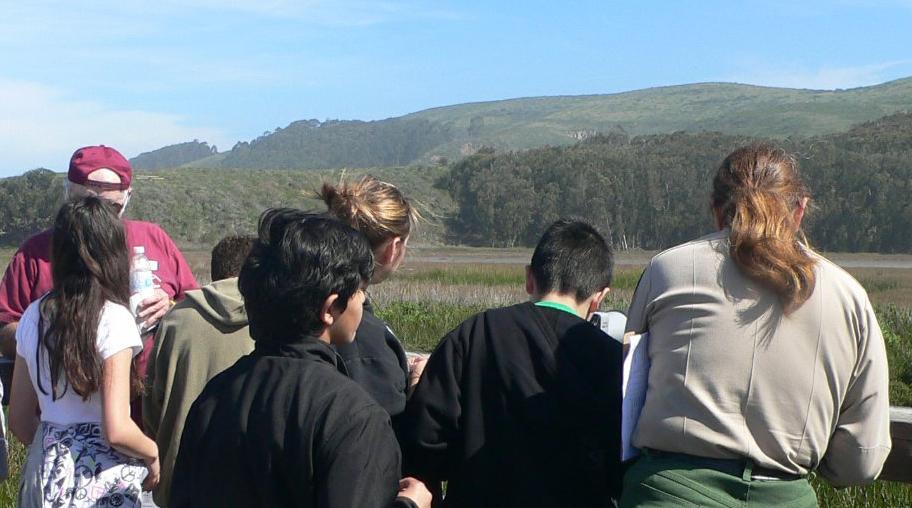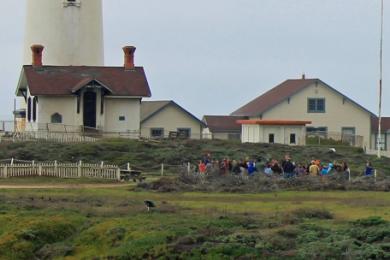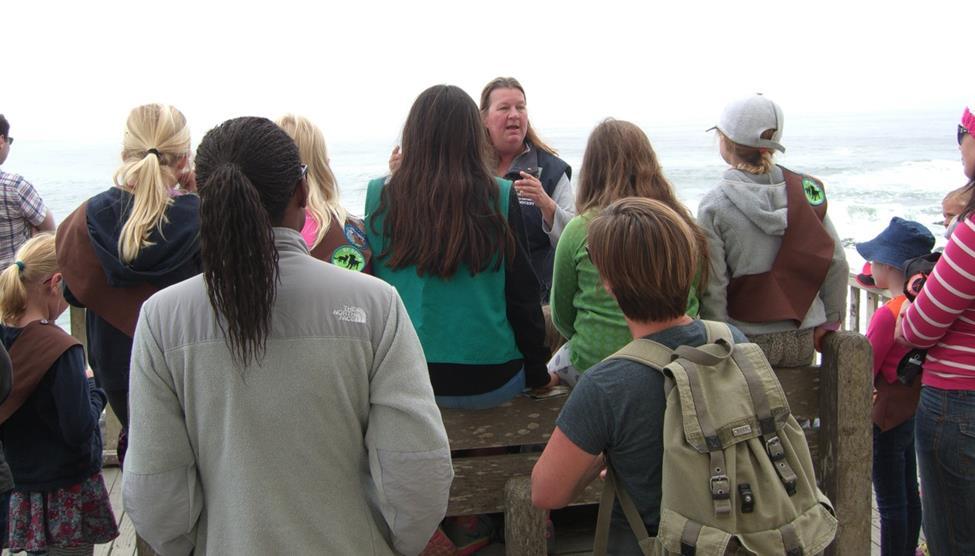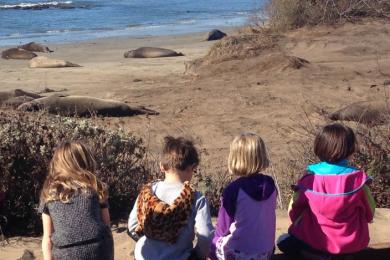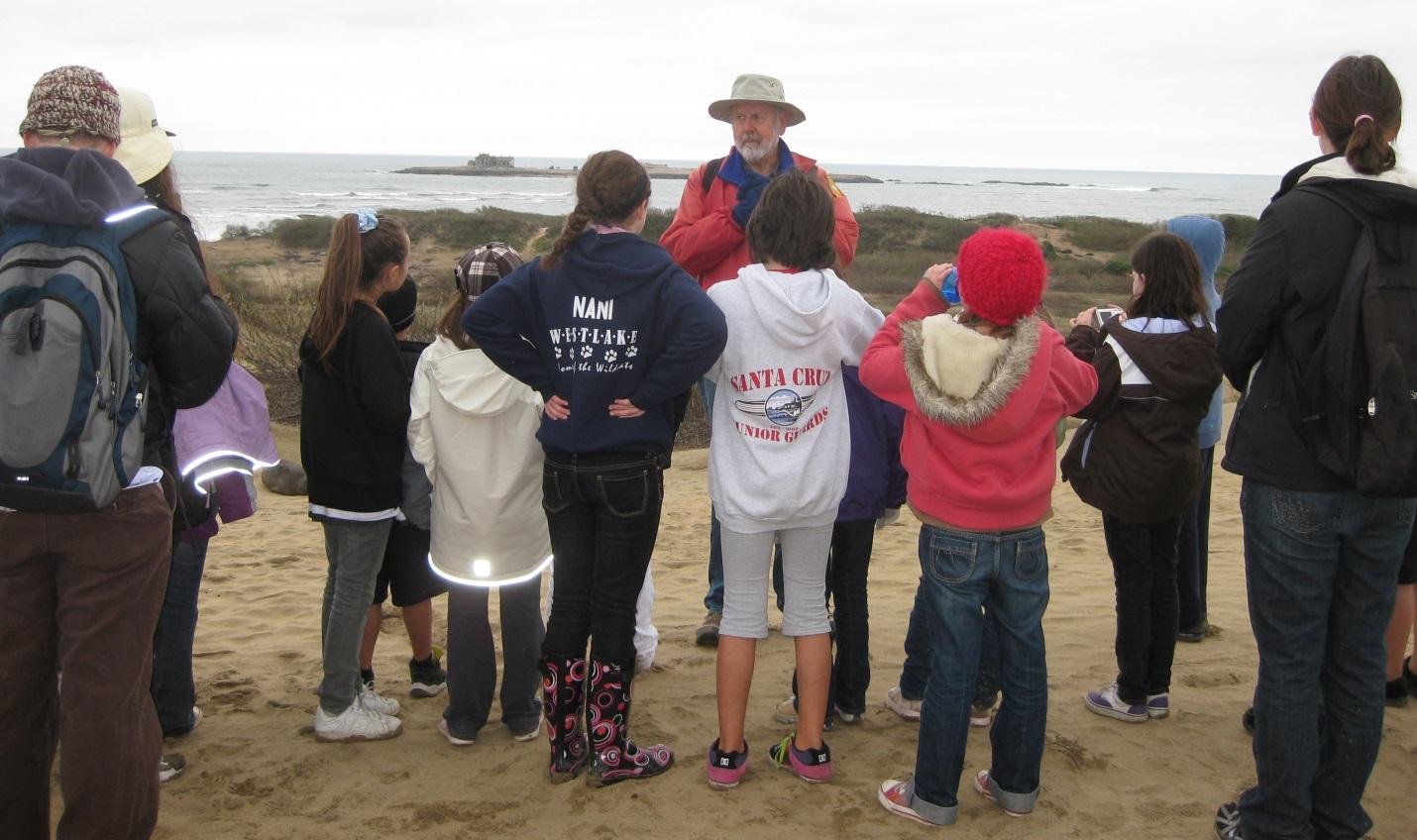Half Moon Bay State Beach
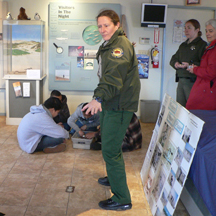
nest building and the threats the
birds face at Francis Beach.
(Photo: © Suzanne Black)
Want to know what that tiny bird is, scurrying across the sandy beach in Half Moon Bay? You could ask one of the volunteer docents leading a group from Hatch Elementary School in Half Moon Bay Or you could ask a second-grader in the group who would tell you “It’s a Snowy Plover,” and then tell you about some of the other shore birds. After learning to use binoculars and observe those birds, visiting the park’s wildlife museum and building a make-believe plover nest, a Hatch fifth-grader could tell you all about the nesting behavior of snowy plovers and how survival of the little birds is threatened.
In 2014, HMB State Park offered 22 on-site and 13 in-classroom educational programs for respectively 500 and 442 students from K-12 and community college classes. Most focused on Francis Beach, a few were for Bean Hollow and Pescadero Marsh. The Bean Hollow field trip focused on geology. The Pescadero Marsh trips focused on the Great Blue Heron / Double-crested Cormorant rookery and native plant adaptations to brackish marsh waters. Twelve schools from San Mateo County participated, plus a few from Alameda, Santa Cruz and Santa Barbara.
School field trips to Pescadero Marsh are very popular. In 2014, per reports to the HMB ranger station, 4007 students were led on visits to the Marsh by counselors from Outdoor Education schools from San Mateo, Santa Cruz and San Joaquin counties. One or more school buses arrive in the central parking lot almost every morning during the week when schools are in session. The numbers of student and public visitors to Pescadero Marsh put considerable stress on the park infrastructure, including stairways, benches, platforms, and the single outhouse. Repair of such facilities is one of CSPA’s continuing fund-raising goals.
Pigeon Point Light Station State Historic Park
Pigeon Point Light Station State Park offers many discoveries to students, including migrating whales, harbor seals, sea lions, and shorebirds, along with sandy beach and rocky shore ecosystems. Most of the school groups come through the Pigeon Point Environmental Education Program (PPEEP) that uses the Pigeon Point Hostel as their base camp. In 2014, PPEEP hosted more than 1250 K-8 students, mostly from the Greater Bay Area, but also throughout Northern California.
Park docents are available for special presentations about the whales, the lighthouse and local history. CSPA is currently supporting efforts for the repair of pathways and extension of the viewing platform behind the Fog Signal Building.
Año Nuevo State Park
Throughout the year, Año Nuevo State Park offers opportunities for school field trips on a multitude of subjects of ecological and historical interest. The park includes a nature preserve and a Marine Education Center housed in a former barn that contains educational displays about the elephant seals, the island, the animals living within the park, and the history of the early Ohlone inhabitants and of the Steele family who farmed the property through the 1950s.
School trips can be scheduled during two seasons. Most are scheduled during the Elephant Seal Breeding Season (December 15 – March 31) when the seals are most active, reservations are required through Reserve America and all tours are docent-led. This is the most heavily scheduled period. Last year (2014), more than 6000 subsidized students visited, with probably an equal number paying full price. A guide for teachers planning school tours is available online. During the Molting Season (April 1 – November 30), there are fewer visitors and scheduling school visits is more flexible. Park docent-led tours can be arranged through the docent coordinator at no charge.
CSPA is currently raising funds for two weatherproof telescopes mounted on a single stand to be installed on the observation deck at Bight Beach. This project is described elsewhere in this newsletter.

